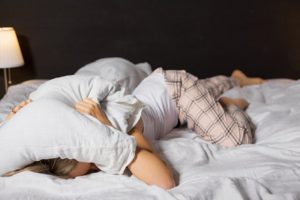 Sleep is a fundamental act we partake in each and every night that keeps us healthy. When we sleep, all of our organs and systems get much-needed rest so that they can continue to function each day. So, when we don’t sleep, this can have detrimental effects both physically and mentally.
Sleep is a fundamental act we partake in each and every night that keeps us healthy. When we sleep, all of our organs and systems get much-needed rest so that they can continue to function each day. So, when we don’t sleep, this can have detrimental effects both physically and mentally.
Specifically, a research study has uncovered that insomnia, or poor sleep, can increase feelings of depression, stress, and anxiety.
Insomnia is linked to stress, anxiety, and depression
Advertisement
The small study included 32 people whose brain activity, eye movements, and other physiological changes were measured over the course of two nights. The researchers found that people who experienced restless rapid eye movement (REM) sleep had a greater risk of experiencing stress and anxiety during their waking hours.
The researchers also studied an additional 1,000 people and found that the more nocturnal thoughts a person had—thoughts that consisted of worry, anxiety, or stress—the more likely they were to feel anxious or depressed the following day.
The study suggests that interrupted sleep—particularly sleep that’s disturbed by thoughts of worry and anxiety—can worsen anxiety during waking hours, which can take a negative toll on a person’s overall health.
The researchers suggest that people experiencing insomnia as a result of nocturnal thoughts should work to ease their worries. This may be done through daytime therapy sessions, relaxation techniques, meditation, or, in some cases, prescription medication to treat anxiety or depression.
Tips to get a good night’s sleep
If you’re struggling to sleep night after night, these tips can help you improve your sleep to ensure you continue to have good overall health.
Regular bedtimes and wake times: Going to sleep each night at the same time and waking up at the same time each morning, even on weekends, helps the body maintain a proper sleep cycle. Keeping a proper sleep schedule will aid your ability to fall asleep and make you feel a lot better throughout the day.
Avoid caffeine in the late afternoon: While your morning cup of coffee is more than okay, it is advisable to avoid any sort of caffeinated drink or food in the late afternoon. It may be difficult to pick these items out, as a lot of snacks and drinks have caffeine in them. It is important to be aware of the foods and drinks you’re ingesting and instead choose water, seltzer, unsweetened decaffeinated herbal tea, or any other caffeine-free beverage in the mid-afternoons and evenings.
Advertisement
Avoid screens: We are bombarded with brightly lit screens everywhere we go. We even take them to bed with us as we read our favorite book on a tablet. Sleep doctors recommend avoiding all electronic screens including e-readers, mobile devices, and television sets at least 30 minutes before bed, as they can impair the body’s natural sleep cycle.
Exercise and diet: Making an effort to exercise and maintaining a healthy diet high in fiber and low in saturated fat and added sugar may improve your sleep, doctors say. A diet like this will also benefit overall heath and quality of life. The American Heart Association recommends that healthy adults get at least 150 minutes of moderate aerobic activity a week. It’s best to perform these exercises in the early morning or right after work, sleep doctors say.
Avoid naps: Doctors recommend avoiding napping if you want better sleep at night. But if a nap can’t be avoided, try to limit it to 20 to 30 minutes earlier in the day.
